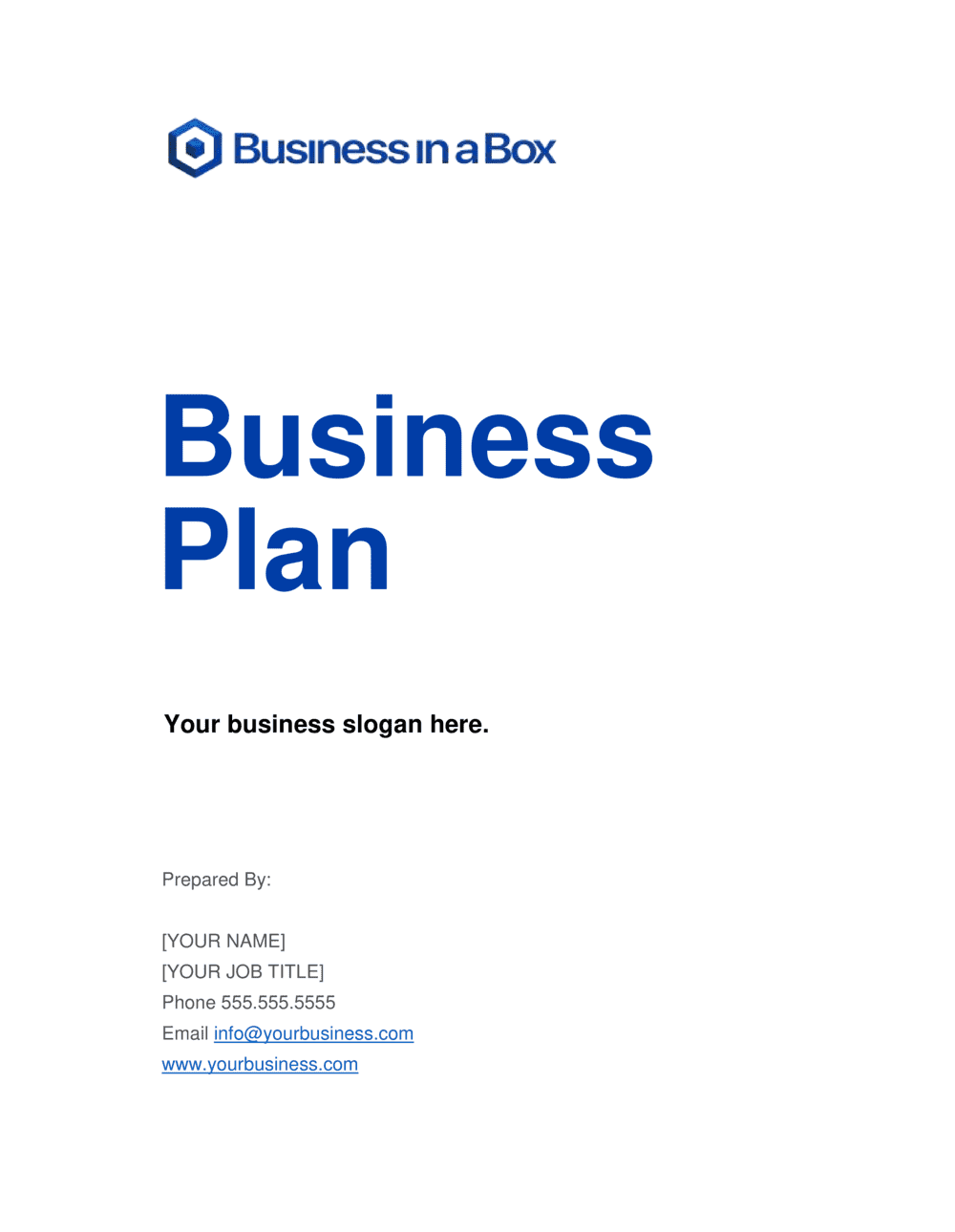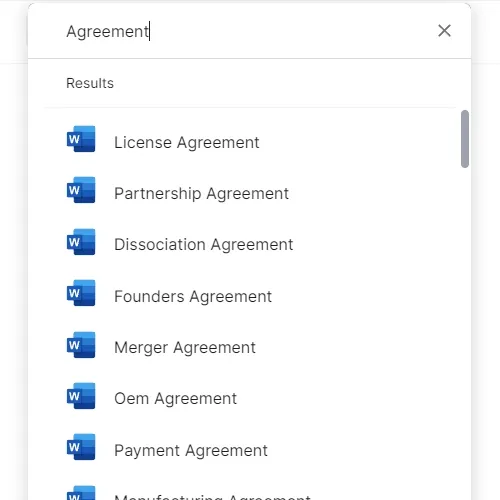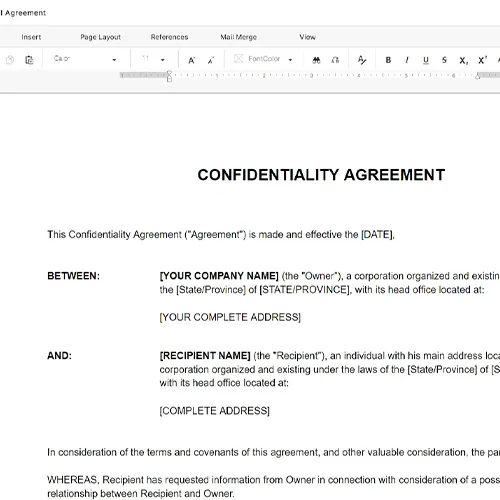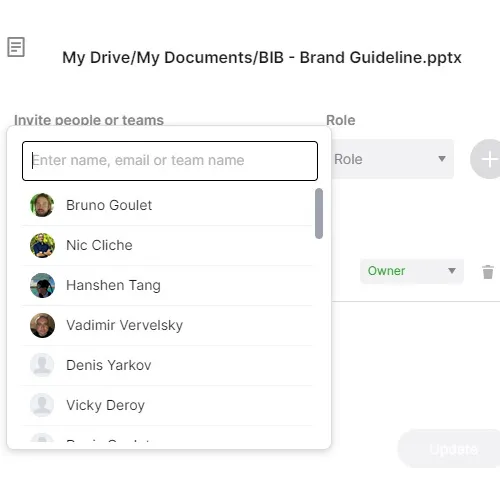Business Plan Template

Crafting an Effective Business Plan to Drive Growth and Secure Investment
A well-structured business plan is the foundation of any successful venture, providing strategic direction, operational insight, and a clear roadmap for growth. Whether you’re launching a new business, expanding an existing one, or seeking investment, a comprehensive business plan aligns your mission with actionable goals, ensuring you’re equipped to navigate challenges and seize opportunities. Business plans aren’t just for startups; they’re valuable tools for established businesses aiming to achieve sustained success in a competitive landscape.
In this guide, we’ll break down the key elements of a business plan, the strategic advantages it provides, and how selecting the right template can help you craft a plan that speaks to investors and supports your business ambitions.
Understanding the Business Plan Template
A business plan template offers a customizable framework to help you outline your company’s objectives, strategies, and financial projections. Each section is designed to present a comprehensive view of your business, appealing to stakeholders and offering a clear sense of direction. The key components of a business plan template typically include:
- Executive Summary
- Market Analysis
- Company Description
- Products and Services
- Marketing and Sales Strategy
- Financial Projections (3 Years)
- Operational Plan
- Risk Management Plan
Using a well-structured business plan template, like those available in Business in a Box, helps ensure that each aspect of your business is thoroughly covered, making your plan a powerful tool for attracting investment and guiding your business to success.
Why a Business Plan is Essential for Growth and Investment
A well-prepared business plan is more than a document; it’s a strategic tool that aligns your mission with realistic goals. Here’s how a detailed business plan can drive growth and enhance your chances of securing investment:
- Securing Funding: Investors require a clear view of your business’s potential, including growth strategies, financial projections, and unique market positioning. A professional business plan provides this information in a structured, compelling format, giving investors the confidence to support your venture.
- Setting Clear Objectives: A business plan helps document your goals, vision, and strategic plans, which is essential for aligning your team and ensuring a unified approach. This alignment fosters a strong sense of purpose, making it easier to achieve your objectives and track progress.
- Navigating Market Challenges: By analyzing market trends, competitors, and demand, a business plan helps you anticipate challenges and pivot when necessary. This insight allows you to stay agile and competitive in an ever-evolving market landscape.
- Improving Financial Management: A business plan includes financial projections and budgeting, helping you outline income, cash flow, and expenses. This enhances your financial planning and management, providing a clearer picture of your business’s financial health.
Business in a Box offers customizable templates that simplify the process of creating a detailed, data-driven business plan tailored to your unique goals. This structured approach allows you to present a compelling case to investors and stakeholders.
Key Sections of a Business Plan Template
Choosing the right template for your business plan is crucial for creating a cohesive, professional document. Below are the essential sections every business plan should include, with an in-depth look at why each one is important.
1. Executive Summary
The executive summary is the first impression of your business plan, providing an overview of your business, mission, products, and financial goals. It should be concise and engaging, offering readers a snapshot of what makes your business unique and worthy of investment.
In crafting your executive summary, focus on:
- Mission Statement: Clearly define your business’s purpose and core values.
- Business Goals: Outline your primary objectives and where you see your business heading.
- High-Level Financial Goals: Provide a brief forecast of revenue or profitability goals.
The executive summary is the part of the plan that investors and stakeholders often read first. It should capture the essence of your business, leaving them interested to explore the details in the following sections.
2. Market Analysis
A thorough market analysis is essential for demonstrating your understanding of the industry landscape, including customer demographics, demand trends, and competition. This section gives stakeholders insight into the market dynamics and helps them assess your potential to succeed in a competitive space.
A strong market analysis includes:
- Industry Overview: Describe the current state of your industry, including any significant trends.
- Target Market: Identify your ideal customers, including their demographics, preferences, and purchasing behavior.
- Competitive Analysis: Outline the strengths and weaknesses of your competitors and how your business will stand out.
Business in a Box’s Market Analysis template provides a comprehensive structure for evaluating these aspects. By demonstrating your industry knowledge and identifying growth opportunities, you enhance your credibility and strategic planning.
3. Company Description
The company description offers background on your business, including its history, structure, and market need. This section gives stakeholders a clear understanding of what sets your business apart and the role it plays in the market.
In the company description, include:
Legal Structure: Define your business structure (e.g., sole proprietorship, LLC, corporation).
Location: Provide details on where your business operates and its geographical reach.
Value Proposition: Explain what makes your business unique, including any specific strengths, innovations, or values.
The company description sets the stage for the rest of the plan by providing context. It should highlight your company’s mission and vision, positioning it as a valuable player in the market.
4. Products and Services
This section details what your business offers, describing your products or services, unique selling points, and pricing models. A comprehensive view of your offerings helps potential investors understand your value proposition and the benefits you provide to customers.
Key points to address:
- Product/Service Overview: Describe what you sell, including any standout features or innovations.
- Unique Selling Points (USPs): Highlight the attributes that make your product or service superior to competitors’.
- Pricing Strategy: Explain how you price your products and any tiers, bundles, or discounts that might apply.
The goal of this section is to illustrate how your offerings align with market demand and customer needs, supporting your case as a viable investment. If possible, consider including visuals or prototypes to make this section more engaging and informative.
5. Marketing and Sales Strategy
A well-defined marketing and sales strategy is essential to reach your target audience, convert leads, and grow revenue. This section outlines how you plan to position, promote, and sell your products or services, showcasing the tactics you’ll employ to attract customers and build brand loyalty.
Consider including the following:
- Target Audience: Define the demographics and psychographics of your ideal customers.
- Marketing Tactics: Outline specific channels and tactics (e.g., social media, email marketing, partnerships) you’ll use to reach your audience.
- Sales Funnel: Describe how you’ll convert leads into paying customers, from awareness to purchase.
This section should give investors confidence that you have a plan to effectively market your business and generate revenue. Business in a Box’s templates help structure this strategy, ensuring that all critical components are covered in a logical, reader-friendly format.
6. Financial Projections (3 Years)
Financial projections are a critical part of any business plan, offering insight into your business’s financial viability and growth potential. These projections help investors assess the risk and return on their investment by outlining your anticipated revenue, expenses, and cash flow.
Key components include:
- Income Statement: Project your expected revenue, expenses, and net income over three years.
- Cash Flow Forecast: Outline how cash will flow in and out of the business, accounting for both operating and investment activities.
- Balance Sheet: Provide an overview of your assets, liabilities, and equity, giving a snapshot of your business’s financial health.
Using Business in a Box’s Financial Projections template provides a structured approach to compiling this data, making it easy to present a realistic, data-driven outlook that builds investor confidence.
7. Operational Plan
The operational plan details the day-to-day activities necessary to run your business, complementing the strategic aspects outlined in other sections. This section covers logistics, resources, and personnel, demonstrating that your business has the infrastructure to support growth.
An effective operational plan includes:
- Daily Operations: Outline key processes involved in delivering your products or services.
- Resource Allocation: Specify the resources—such as facilities, equipment, and technology—needed to operate.
- Personnel: Describe the roles and responsibilities of team members, as well as any hiring plans.
A well-outlined operational plan assures investors that your business is prepared for growth and capable of scaling operations as demand increases. The Operational Plan template from Business in a Box provides a practical structure for detailing these essential elements.
8. Risk Management Plan
A proactive risk management plan demonstrates your awareness of potential challenges and your preparedness to address them. This section identifies potential risks, outlines mitigation strategies, and provides contingency plans to navigate uncertainties.
To create an effective risk management plan:
- Identify Risks: List potential risks your business may face, such as market volatility, operational issues, or regulatory changes.
- Mitigation Strategies: Describe strategies for reducing the likelihood or impact of these risks.
- Contingency Plans: Outline backup plans for worst-case scenarios, demonstrating your adaptability.
Using Business in a Box’s Risk Management Plan template ensures that you cover all aspects thoroughly, helping investors feel confident in your approach to risk management.
Supporting Documents for Structuring a Business Plan
To enhance the functionality and comprehensiveness of a Business Plan, integrating related documents is advisable. These additional documents complement each section, providing detailed insights and strategic planning to support your business vision:
- Market Analysis - Delivers comprehensive evaluations of market trends, customer demographics, and competitive landscapes, crucial for informing strategic business decisions and supporting detailed market assessments. Explore our Market Analysis template.
- Financial Projections (3 Years) - Provides extensive financial forecasts, including income statements, cash flow estimates, and balance sheets. This document is crucial for assessing the business's viability and supporting strategic planning over a three-year period. Explore our Financial Projections template.
- Operational Plan - Details the day-to-day operations necessary to run the business, complementing the strategic overview and ensuring that resources, logistics, and personnel are effectively organized to meet business objectives. Explore our Operational Plan template.
- Risk Management Plan - Assesses potential risks and outlines strategies to mitigate them, ensuring the business is well-prepared for uncertainties. This document provides a structured approach to addressing challenges, enabling resilience in fluctuating market conditions. Explore our Risk Management Plan template.
Incorporating these supporting documents with your business plan enhances its depth, precision, and effectiveness. By addressing critical areas of analysis, operations, financials, and risk, these documents reinforce the strength of your business proposal, ensuring it’s well-rounded and thoroughly prepared for investor and stakeholder scrutiny.
How Business in a Box Simplifies Business Plan Creation
Creating a comprehensive business plan can be overwhelming, especially when it comes to organizing information and ensuring every essential section is included. Business in a Box offers a suite of customizable templates to simplify this process. By using these templates, you can save time, reduce costs, and present a professional, polished plan that appeals to stakeholders.
With Business in a Box’s business plan templates, you gain access to:
- 3,000+ Templates Across Business Needs - From business plans to financial projections, marketing plans, and operational strategies, our extensive library ensures you have all the documents you need in one place.
- Centralized Cloud Storage - Store, edit, and share all your business documents in a secure cloud environment, enabling collaboration with team members and easy access from any device.
- Legal and Financial Compliance - Business in a Box templates are crafted by experts to ensure adherence to best practices and industry standards, providing the peace of mind that your documents meet professional requirements.
- Ease of Collaboration - Share your business plan with investors, team members, or advisors directly through the platform, making it easy to gather feedback and make revisions as needed.
- User-Friendly Interface - Our templates are designed to be easy to use, guiding you through each section with prompts and instructions to help you convey your business vision effectively.
Business in a Box empowers businesses to create detailed, professional documents with minimal effort. This streamlined approach allows you to focus on building your business and refining your strategies, rather than getting bogged down by formatting or structure.
Getting Started with Business in a Box
Building a business plan with Business in a Box’s templates provides a structured framework that can help you achieve your goals, whether you’re seeking investment, expanding operations, or developing a new product. By following the prompts and guidelines in each section, you’ll ensure that your business plan is comprehensive, data-driven, and tailored to your specific needs.
To get started, consider the following steps:
- Define Your Goals - Before you dive into the template, clearly outline the primary objectives of your business plan. This focus will guide you as you customize each section.
- Gather Data and Research - Collect relevant information, such as market research, financial data, and competitor analysis. The more accurate and detailed your data, the more compelling your business plan will be.
- Use Business in a Box Templates - Access our suite of templates, such as Market Analysis, Financial Projections, and Risk Management, to help you organize complex information into cohesive sections.
- Customize for Your Audience - Tailor your business plan to speak directly to potential investors, partners, or other stakeholders. Each section should reinforce why your business is a strong investment opportunity.
- Review and Revise - Edit your business plan to ensure clarity, accuracy, and professionalism. You can easily make adjustments and incorporate feedback within the Business in a Box platform.
Whether you’re an entrepreneur or an established business owner, Business in a Box provides the tools you need to create a business plan that communicates your vision, strategy, and potential effectively.
Final Thoughts
A well-crafted business plan is instrumental in building a successful business, securing funding, and navigating growth opportunities. By documenting your strategies, objectives, and financial projections, you create a roadmap that guides your business and inspires confidence in your stakeholders.
Business in a Box offers a robust suite of templates that make business planning straightforward and accessible, allowing you to focus on what matters most—growing your business and achieving your goals. With a professionally structured business plan, you’ll be well-positioned to stand out in a competitive market and attract the support and investment you need for sustainable success.
Ready to get started? Explore our Business Plan templates today and discover how Business in a Box can simplify the process, empower your planning, and set you on the path to growth.
Reviewed on

Crafting an Effective Business Plan to Drive Growth and Secure Investment
A well-structured business plan is the foundation of any successful venture, providing strategic direction, operational insight, and a clear roadmap for growth. Whether you’re launching a new business, expanding an existing one, or seeking investment, a comprehensive business plan aligns your mission with actionable goals, ensuring you’re equipped to navigate challenges and seize opportunities. Business plans aren’t just for startups; they’re valuable tools for established businesses aiming to achieve sustained success in a competitive landscape.
In this guide, we’ll break down the key elements of a business plan, the strategic advantages it provides, and how selecting the right template can help you craft a plan that speaks to investors and supports your business ambitions.
Understanding the Business Plan Template
A business plan template offers a customizable framework to help you outline your company’s objectives, strategies, and financial projections. Each section is designed to present a comprehensive view of your business, appealing to stakeholders and offering a clear sense of direction. The key components of a business plan template typically include:
- Executive Summary
- Market Analysis
- Company Description
- Products and Services
- Marketing and Sales Strategy
- Financial Projections (3 Years)
- Operational Plan
- Risk Management Plan
Using a well-structured business plan template, like those available in Business in a Box, helps ensure that each aspect of your business is thoroughly covered, making your plan a powerful tool for attracting investment and guiding your business to success.
Why a Business Plan is Essential for Growth and Investment
A well-prepared business plan is more than a document; it’s a strategic tool that aligns your mission with realistic goals. Here’s how a detailed business plan can drive growth and enhance your chances of securing investment:
- Securing Funding: Investors require a clear view of your business’s potential, including growth strategies, financial projections, and unique market positioning. A professional business plan provides this information in a structured, compelling format, giving investors the confidence to support your venture.
- Setting Clear Objectives: A business plan helps document your goals, vision, and strategic plans, which is essential for aligning your team and ensuring a unified approach. This alignment fosters a strong sense of purpose, making it easier to achieve your objectives and track progress.
- Navigating Market Challenges: By analyzing market trends, competitors, and demand, a business plan helps you anticipate challenges and pivot when necessary. This insight allows you to stay agile and competitive in an ever-evolving market landscape.
- Improving Financial Management: A business plan includes financial projections and budgeting, helping you outline income, cash flow, and expenses. This enhances your financial planning and management, providing a clearer picture of your business’s financial health.
Business in a Box offers customizable templates that simplify the process of creating a detailed, data-driven business plan tailored to your unique goals. This structured approach allows you to present a compelling case to investors and stakeholders.
Key Sections of a Business Plan Template
Choosing the right template for your business plan is crucial for creating a cohesive, professional document. Below are the essential sections every business plan should include, with an in-depth look at why each one is important.
1. Executive Summary
The executive summary is the first impression of your business plan, providing an overview of your business, mission, products, and financial goals. It should be concise and engaging, offering readers a snapshot of what makes your business unique and worthy of investment.
In crafting your executive summary, focus on:
- Mission Statement: Clearly define your business’s purpose and core values.
- Business Goals: Outline your primary objectives and where you see your business heading.
- High-Level Financial Goals: Provide a brief forecast of revenue or profitability goals.
The executive summary is the part of the plan that investors and stakeholders often read first. It should capture the essence of your business, leaving them interested to explore the details in the following sections.
2. Market Analysis
A thorough market analysis is essential for demonstrating your understanding of the industry landscape, including customer demographics, demand trends, and competition. This section gives stakeholders insight into the market dynamics and helps them assess your potential to succeed in a competitive space.
A strong market analysis includes:
- Industry Overview: Describe the current state of your industry, including any significant trends.
- Target Market: Identify your ideal customers, including their demographics, preferences, and purchasing behavior.
- Competitive Analysis: Outline the strengths and weaknesses of your competitors and how your business will stand out.
Business in a Box’s Market Analysis template provides a comprehensive structure for evaluating these aspects. By demonstrating your industry knowledge and identifying growth opportunities, you enhance your credibility and strategic planning.
3. Company Description
The company description offers background on your business, including its history, structure, and market need. This section gives stakeholders a clear understanding of what sets your business apart and the role it plays in the market.
In the company description, include:
Legal Structure: Define your business structure (e.g., sole proprietorship, LLC, corporation).
Location: Provide details on where your business operates and its geographical reach.
Value Proposition: Explain what makes your business unique, including any specific strengths, innovations, or values.
The company description sets the stage for the rest of the plan by providing context. It should highlight your company’s mission and vision, positioning it as a valuable player in the market.
4. Products and Services
This section details what your business offers, describing your products or services, unique selling points, and pricing models. A comprehensive view of your offerings helps potential investors understand your value proposition and the benefits you provide to customers.
Key points to address:
- Product/Service Overview: Describe what you sell, including any standout features or innovations.
- Unique Selling Points (USPs): Highlight the attributes that make your product or service superior to competitors’.
- Pricing Strategy: Explain how you price your products and any tiers, bundles, or discounts that might apply.
The goal of this section is to illustrate how your offerings align with market demand and customer needs, supporting your case as a viable investment. If possible, consider including visuals or prototypes to make this section more engaging and informative.
5. Marketing and Sales Strategy
A well-defined marketing and sales strategy is essential to reach your target audience, convert leads, and grow revenue. This section outlines how you plan to position, promote, and sell your products or services, showcasing the tactics you’ll employ to attract customers and build brand loyalty.
Consider including the following:
- Target Audience: Define the demographics and psychographics of your ideal customers.
- Marketing Tactics: Outline specific channels and tactics (e.g., social media, email marketing, partnerships) you’ll use to reach your audience.
- Sales Funnel: Describe how you’ll convert leads into paying customers, from awareness to purchase.
This section should give investors confidence that you have a plan to effectively market your business and generate revenue. Business in a Box’s templates help structure this strategy, ensuring that all critical components are covered in a logical, reader-friendly format.
6. Financial Projections (3 Years)
Financial projections are a critical part of any business plan, offering insight into your business’s financial viability and growth potential. These projections help investors assess the risk and return on their investment by outlining your anticipated revenue, expenses, and cash flow.
Key components include:
- Income Statement: Project your expected revenue, expenses, and net income over three years.
- Cash Flow Forecast: Outline how cash will flow in and out of the business, accounting for both operating and investment activities.
- Balance Sheet: Provide an overview of your assets, liabilities, and equity, giving a snapshot of your business’s financial health.
Using Business in a Box’s Financial Projections template provides a structured approach to compiling this data, making it easy to present a realistic, data-driven outlook that builds investor confidence.
7. Operational Plan
The operational plan details the day-to-day activities necessary to run your business, complementing the strategic aspects outlined in other sections. This section covers logistics, resources, and personnel, demonstrating that your business has the infrastructure to support growth.
An effective operational plan includes:
- Daily Operations: Outline key processes involved in delivering your products or services.
- Resource Allocation: Specify the resources—such as facilities, equipment, and technology—needed to operate.
- Personnel: Describe the roles and responsibilities of team members, as well as any hiring plans.
A well-outlined operational plan assures investors that your business is prepared for growth and capable of scaling operations as demand increases. The Operational Plan template from Business in a Box provides a practical structure for detailing these essential elements.
8. Risk Management Plan
A proactive risk management plan demonstrates your awareness of potential challenges and your preparedness to address them. This section identifies potential risks, outlines mitigation strategies, and provides contingency plans to navigate uncertainties.
To create an effective risk management plan:
- Identify Risks: List potential risks your business may face, such as market volatility, operational issues, or regulatory changes.
- Mitigation Strategies: Describe strategies for reducing the likelihood or impact of these risks.
- Contingency Plans: Outline backup plans for worst-case scenarios, demonstrating your adaptability.
Using Business in a Box’s Risk Management Plan template ensures that you cover all aspects thoroughly, helping investors feel confident in your approach to risk management.
Supporting Documents for Structuring a Business Plan
To enhance the functionality and comprehensiveness of a Business Plan, integrating related documents is advisable. These additional documents complement each section, providing detailed insights and strategic planning to support your business vision:
- Market Analysis - Delivers comprehensive evaluations of market trends, customer demographics, and competitive landscapes, crucial for informing strategic business decisions and supporting detailed market assessments. Explore our Market Analysis template.
- Financial Projections (3 Years) - Provides extensive financial forecasts, including income statements, cash flow estimates, and balance sheets. This document is crucial for assessing the business's viability and supporting strategic planning over a three-year period. Explore our Financial Projections template.
- Operational Plan - Details the day-to-day operations necessary to run the business, complementing the strategic overview and ensuring that resources, logistics, and personnel are effectively organized to meet business objectives. Explore our Operational Plan template.
- Risk Management Plan - Assesses potential risks and outlines strategies to mitigate them, ensuring the business is well-prepared for uncertainties. This document provides a structured approach to addressing challenges, enabling resilience in fluctuating market conditions. Explore our Risk Management Plan template.
Incorporating these supporting documents with your business plan enhances its depth, precision, and effectiveness. By addressing critical areas of analysis, operations, financials, and risk, these documents reinforce the strength of your business proposal, ensuring it’s well-rounded and thoroughly prepared for investor and stakeholder scrutiny.
How Business in a Box Simplifies Business Plan Creation
Creating a comprehensive business plan can be overwhelming, especially when it comes to organizing information and ensuring every essential section is included. Business in a Box offers a suite of customizable templates to simplify this process. By using these templates, you can save time, reduce costs, and present a professional, polished plan that appeals to stakeholders.
With Business in a Box’s business plan templates, you gain access to:
- 3,000+ Templates Across Business Needs - From business plans to financial projections, marketing plans, and operational strategies, our extensive library ensures you have all the documents you need in one place.
- Centralized Cloud Storage - Store, edit, and share all your business documents in a secure cloud environment, enabling collaboration with team members and easy access from any device.
- Legal and Financial Compliance - Business in a Box templates are crafted by experts to ensure adherence to best practices and industry standards, providing the peace of mind that your documents meet professional requirements.
- Ease of Collaboration - Share your business plan with investors, team members, or advisors directly through the platform, making it easy to gather feedback and make revisions as needed.
- User-Friendly Interface - Our templates are designed to be easy to use, guiding you through each section with prompts and instructions to help you convey your business vision effectively.
Business in a Box empowers businesses to create detailed, professional documents with minimal effort. This streamlined approach allows you to focus on building your business and refining your strategies, rather than getting bogged down by formatting or structure.
Getting Started with Business in a Box
Building a business plan with Business in a Box’s templates provides a structured framework that can help you achieve your goals, whether you’re seeking investment, expanding operations, or developing a new product. By following the prompts and guidelines in each section, you’ll ensure that your business plan is comprehensive, data-driven, and tailored to your specific needs.
To get started, consider the following steps:
- Define Your Goals - Before you dive into the template, clearly outline the primary objectives of your business plan. This focus will guide you as you customize each section.
- Gather Data and Research - Collect relevant information, such as market research, financial data, and competitor analysis. The more accurate and detailed your data, the more compelling your business plan will be.
- Use Business in a Box Templates - Access our suite of templates, such as Market Analysis, Financial Projections, and Risk Management, to help you organize complex information into cohesive sections.
- Customize for Your Audience - Tailor your business plan to speak directly to potential investors, partners, or other stakeholders. Each section should reinforce why your business is a strong investment opportunity.
- Review and Revise - Edit your business plan to ensure clarity, accuracy, and professionalism. You can easily make adjustments and incorporate feedback within the Business in a Box platform.
Whether you’re an entrepreneur or an established business owner, Business in a Box provides the tools you need to create a business plan that communicates your vision, strategy, and potential effectively.
Final Thoughts
A well-crafted business plan is instrumental in building a successful business, securing funding, and navigating growth opportunities. By documenting your strategies, objectives, and financial projections, you create a roadmap that guides your business and inspires confidence in your stakeholders.
Business in a Box offers a robust suite of templates that make business planning straightforward and accessible, allowing you to focus on what matters most—growing your business and achieving your goals. With a professionally structured business plan, you’ll be well-positioned to stand out in a competitive market and attract the support and investment you need for sustainable success.
Ready to get started? Explore our Business Plan templates today and discover how Business in a Box can simplify the process, empower your planning, and set you on the path to growth.
Easily Create Any Business Document You Need in Minutes.

Download or open template
Access over 3,000+ business and legal templates for any business task, project or initiative.

Edit and fill in the blanks
Customize your ready-made business document template and save it in the cloud.

Save, Share, Export, or Sign
Share your files and folders with your team. Create a space of seamless collaboration.


